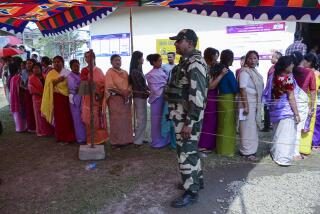Despite Computer Glitch, Bosnia Voting Mostly Calm
- Share via
SARAJEVO, Bosnia-Herzegovina — Bosnia’s second postwar national election started Saturday, with Western powers hoping voters will ignore the ethnic parties that are slowing implementation of the 1995 peace agreement.
The first day of weekend balloting was mostly calm, but a few dozen of the more than 2,600 polling stations failed to open after a computer problem prevented officials from having voter lists on hand.
The problem should be solved when voting resumes today, and everyone who registered will be able to cast ballots, said Nicole Szulc, spokeswoman for the Organization for Security and Cooperation in Europe, which is running the election.
Angry crowds gathered to protest the delay at some of the closed polling stations, with one group blocking a road in northern Bosnia. All dispersed when the problem was explained, officials said.
Jacques Paul Klein, the U.S. deputy to Carlos Westendorp, the European overseer of Bosnia, said voting might continue Monday if the delays at some stations aren’t resolved today.
“You vote until everyone has a chance to vote,” he said.
The election is considered crucial to the future of the 1995 Dayton, Ohio, peace accord, which halted the war in the former Yugoslav republic.
Under the peace plan, Bosnia-Herzegovina is divided into two ethnic-based entities, Republika Srpska and the Muslim-Croat Federation, with the goal of forcing a democratic evolution in the onetime communist territory.
But hard-line politicians on all three sides and ethnic mistrust have slowed progress. One of the major issues is refugees: an estimated 1 million displaced people cannot go home to areas controlled by rival ethnic groups.
“I am casting my vote so that I can return home,” said Salih Mrmic, a 61-year-old Muslim refugee from the eastern town of Srebrenica, which was overrun by Serbs during the war. “Without the return of refugees, there will be no lasting peace in this country.”
Western allies led by the United States and the European Union, who effectively run the country now under the Dayton agreement, hope ethnic-driven political parties that waged the war will lose support this weekend and eventually fade away.
In the first postwar election in 1996 and in a local ballot last year, the ruling hard-line parties lost significant support among most Bosnians. But ethnic nationalist sentiments remain strong, and the outcome of major races involving hard-line candidates was uncertain.
A total of 83 parties and coalitions, as well as independent candidates, are listed on the complicated ballots. Voters only choose leaders in the entity in which they registered. More than 2.7 million of Bosnia’s 4.3 million people are registered.
More to Read
Sign up for Essential California
The most important California stories and recommendations in your inbox every morning.
You may occasionally receive promotional content from the Los Angeles Times.













